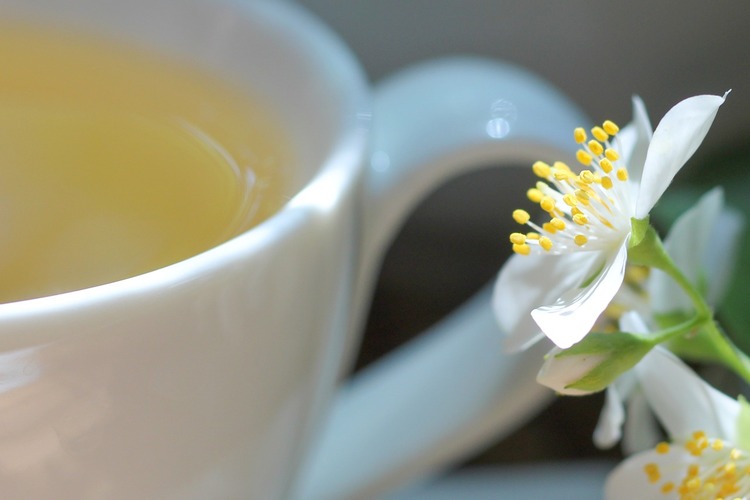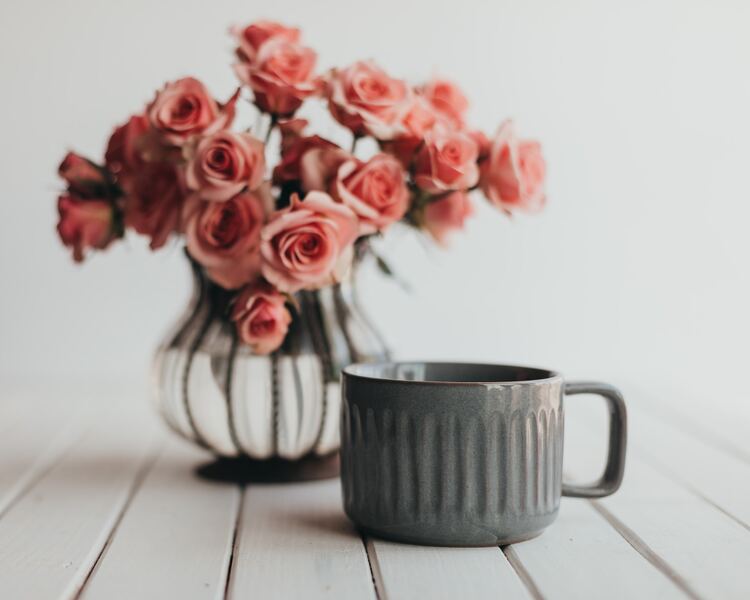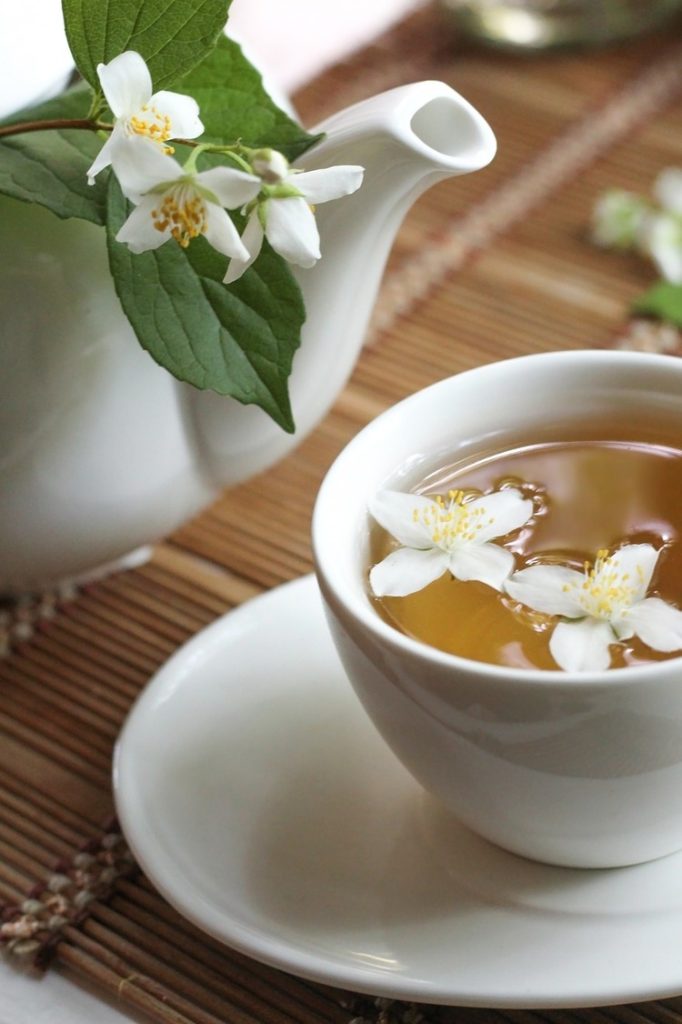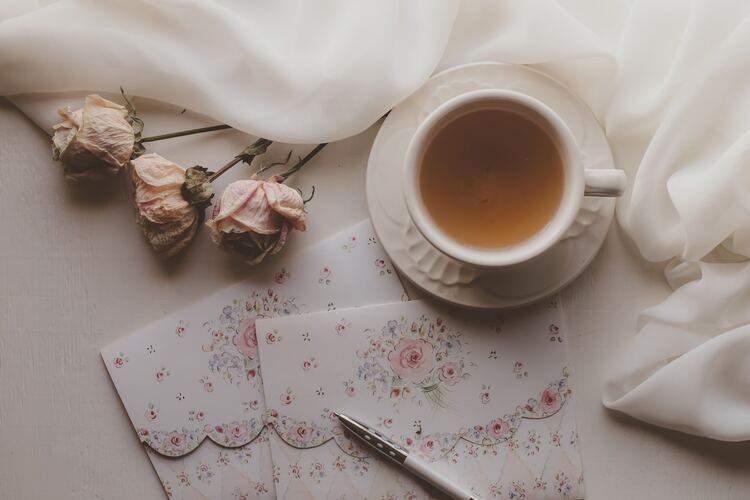Jasmine rose tea is a delightful blend that combines the fragrant aroma of jasmine flowers with the sweet taste of rose petals.
This tea is typically made with a base of green tea, which is known for its numerous health benefits. Green tea is packed with antioxidants and has been shown to boost metabolism, improve brain function, and even lower the risk of certain cancers.
When combined with the soothing properties of jasmine and the anti-inflammatory effects of rose petals, jasmine rose tea becomes a delicious and healthy beverage.
Join us as we explore the different facets of this exquisite blend.
Please note: This article contains affiliate links, meaning I may earn a commission if you make a purchase by clicking a link. Of course, this comes at no extra cost to you and helps me keep offering readers solid information.

About the Tea’s Origin
Jasmine and rose teas are typically prepared separately and come from different regions and cultures.
Jasmine tea is a traditional Chinese tea that originated in Fujian province. It involves scenting green tea leaves with jasmine flowers, creating a fragrant and aromatic blend. Making jasmine tea involves layering freshly picked flowers with tea leaves and allowing the tea leaves to absorb the floral aroma.
Rose tea, on the other hand, can be made from various rose species and is consumed in various cultures around the world. Rose petals or buds are typically dried and used to brew the tea. It’s known for its delicate floral flavor and potential health benefits.
Jasmine rose blends may have been created by tea artisans, enthusiasts, or manufacturers as a unique blend (like the hundreds available nowadays). This is not a traditional tea variety with a specific place of origin.
Crafting Jasmine Rose Tea
To craft jasmine rose tea, producers or master blenders start with high-quality ingredients. The tea is typically made from green tea leaves, jasmine flowers, and rose petals. The flowers and petals are carefully picked by hand and then dried to preserve their natural flavor.
Once the flowers and petals have been dried, they are mixed with the green tea leaves to create a unique blend. This blend is then carefully stored in airtight containers to preserve freshness and flavor.
You can find these blends in the market (we provide recommendations later).
The other option is to prepare your blend at home. To do this, you will need jasmine green tea (remember this is a traditional Chinese scented tea) and rose petals or buds. Combine the ingredients at a 2:1 ratio of jasmine tea to rose petals. You can adjust the ratio according to your taste preferences.
Types of Jasmine Rose Tea
We have mentioned this tea blend usually uses green tea as a base. However, you can acquire (or prepare) the blend with other bases. We provide more details below.
Jasmine Pearls
Jasmine pearls are a type of green tea that is scented with jasmine flowers. The tea leaves are rolled into tiny pearls. Then, these pearls are infused with jasmine flowers. This tea has a sweet and delicate flavor with a floral aroma, perfect for relaxation. The tea pearls are also visually appealing, making them an excellent gift-giving choice.
White Tea
White tea is another type of tea that is often scented with jasmine flowers. This tea is made from the tea plant’s youngest leaves, giving it a delicate flavor and a light, floral aroma. White tea is also low in caffeine, making it a great choice for those sensitive to caffeine.
Flower Tea
Flower tea is a blend of different types of flowers. This tea has a light, floral flavor and aroma that is perfect for relaxation. In this case, jasmine and rose petals are mixed. A true tea, like green or white, is not included in the blend.
Organic Tea
The organic version of the blend is made with ingredients that have been grown without the use of pesticides or other harmful chemicals. This tea is an option for those looking for a more natural and sustainable option. Organic tea also has a more authentic flavor, as it is not processed with any artificial additives.

Steeping Instructions
Temperature
To ensure the best flavor, it is recommended to steep the tea at a temperature between 175°F and 185°F (80°C and 85°C). This temperature range helps to bring out the delicate floral notes of the tea.
Time
The optimal steeping time is 2-3 minutes. Steeping for longer than this can result in a bitter taste. However, steeping for less than 2 minutes may produce a weaker flavor.
Quantity
For a single serving of jasmine rose tea, use 1 teaspoon (2 grams) of loose tea leaves per cup of water (8 oz). This amount can be increased or decreased depending on your personal preference.
To prepare the tea, follow these simple steps:
- Boil water and let it cool down to the recommended temperature.
- Add the tea leaves to a tea infuser or strainer.
- Place the infuser/strainer in a teapot or cup.
- Pour the hot water over the tea leaves.
- Let it steep for 2-3 minutes.
- Remove the infuser/strainer and discard the tea leaves.
- Enjoy your delicious cup of tea!
Remember, the quality of the water you use can also affect the taste of the tea. It is recommended to use filtered or spring water for the best results.
Health Benefits
Jasmine rose rea is not only a refreshing and aromatic beverage, but it also offers numerous health benefits. You can enjoy some benefits by incorporating the tea into your daily routine.
Weight Management
If you are trying to maintain a healthy weight, this tea can be a great addition to your diet. This tea is low in calories and can help you feel full and satisfied, reducing your overall calorie intake. Additionally, the caffeine in the tea can boost your metabolism, helping you burn more calories throughout the day.
Blood Pressure Regulation
Jasmine rose tea has been shown to help regulate blood pressure levels. The tea contains polyphenols, which can help relax blood vessels and improve blood flow. This can help reduce the risk of hypertension and other cardiovascular diseases.
Metabolism Boost
The caffeine in jasmine rose tea can also provide a natural energy boost and improve your metabolism. This can help you feel more alert and focused throughout the day, while also burning more calories.
Liver Health
The tea contains antioxidants that can help protect your liver from damage caused by toxins and free radicals. This can help improve liver function and reduce the risk of liver disease.
Skin Health
The tea is rich in antioxidants, which can help protect your skin from damage caused by free radicals. This can help reduce the signs of aging, such as fine lines and wrinkles, and improve overall skin health.

Pairing Jasmine Rose Tea
Jasmine rose tea is a delicate and fragrant tea that pairs well with various foods and flavors.
Here are a few pairing ideas:
- Fruit Salad: A light and refreshing fruit salad pairs perfectly with jasmine and rose flavors. The sweetness of the fruit complements the delicate floral notes of the tea, while the tea’s subtle sweetness enhances the natural sweetness of the fruit.
- Honey Toast: If you want a sweet treat to enjoy with your tea, try some honey toast. The honey adds a touch of sweetness that pairs well with the tea’s floral notes.
- Scones: Scones are a classic tea-time treat that pairs well with a jasmine rose blend. The buttery, flaky texture of the scones complements the delicate flavors of the tea.
- Chocolate: For a decadent treat, pair your jasmine rose tea with some chocolate—the rich, creamy flavor of the chocolate pairs well with the tea’s floral notes.
- Cheese Plate: If you’re looking for a savory pairing, try a cheese plate. The creamy, salty flavors of the cheese complement the delicate floral notes of the tea.
Buying Recommendations
You can acquire a jasmine rose blend or, the ingredients to prepare your blend at home. Here are some ideas:
- Local Tea Shops: Specialty tea shops often have a variety of loose-leaf teas and dried herbs, including jasmine tea and dried rose petals.
- Online Retailers: Websites like Amazon, Adagio Teas, and Harney & Sons offer a wide range of teas.
- Farmer’s Markets: Some farmer’s markets might have vendors selling loose-leaf teas and dried herbs.
- Herbal Stores: Stores specializing in herbs and natural products might carry dried rose petals suitable for tea blending.
If you are considering buying online, please take into consideration the following recommendations:
Davidson’s Organics, Jasmine Rose, Loose Leaf Tea (Green Tea Base)

Premium Jasmine Silver Needle White Tea & Rose Buds (White Tea Base)

Taimei Teatime Rose Jasmine Herbal Tea Loose Leaf (Herbal – No True Tea Included)

Loose Leaf Jasmine Dragon Pearls Green Tea


Frequently Asked Questions
What are the health benefits of drinking jasmine rose tea?
A jasmine and rose tea blend is a great source of antioxidants and can help reduce inflammation in the body. It is also known to boost the immune system and promote healthy skin.
How does jasmine rose tea promote relaxation?
The scent of jasmine and rose has a calming effect on the mind and body, making jasmine rose tea a great choice for those looking to unwind and de-stress.
Can jasmine rose tea help with digestion?
This tea can help soothe the digestive system and reduce inflammation in the gut. It may also help alleviate symptoms of bloating and indigestion.
Is jasmine rose tea suitable for people with caffeine sensitivity?
This tea contains caffeine, although in smaller amounts than traditional black tea or coffee. If you are sensitive to caffeine, consuming jasmine rose tea in moderation is best, or opt for a caffeine-free version.
Are there any potential risks associated with drinking jasmine rose tea?
While this tea is generally considered safe for most people, it is important to note that excessive consumption may lead to adverse effects such as insomnia, restlessness, and increased heart rate.
What are the flavor notes of jasmine rose tea?
The jasmine rose tea blend has a delicate floral aroma with a sweet and slightly fruity taste. The jasmine and rose petals add a subtle hint of perfume to the tea, making it a refreshing and aromatic beverage.

I hope you have enjoyed the article. This is such an enticing mix. I hope you are encouraged to try it.
Have you tried this blend?
More About Floral Teas
What Does Jasmine Tea Taste Like?
What Does Hibiscus Tea Taste Like?
What Does Rose Tea Taste Like?
What Does Chrysanthemum Tea Taste Like?
What Does Lavender Tea Taste Like?
What Does Mullein Tea Taste Like?
What Does Red Clover Tea Taste Like?